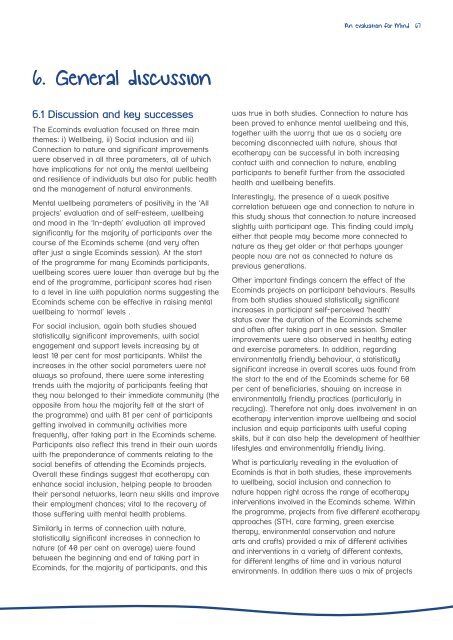Ecominds-effects-on-mental-wellbeing-evaluation-report
Ecominds-effects-on-mental-wellbeing-evaluation-report
Ecominds-effects-on-mental-wellbeing-evaluation-report
You also want an ePaper? Increase the reach of your titles
YUMPU automatically turns print PDFs into web optimized ePapers that Google loves.
An evaluati<strong>on</strong> for Mind 676. General discussi<strong>on</strong>6.1 Discussi<strong>on</strong> and key successesThe <str<strong>on</strong>g>Ecominds</str<strong>on</strong>g> evaluati<strong>on</strong> focused <strong>on</strong> three mainthemes: i) Wellbeing, ii) Social inclusi<strong>on</strong> and iii)C<strong>on</strong>necti<strong>on</strong> to nature and significant improvementswere observed in all three parameters, all of whichhave implicati<strong>on</strong>s for not <strong>on</strong>ly the <strong>mental</strong> <strong>wellbeing</strong>and resilience of individuals but also for public healthand the management of natural envir<strong>on</strong>ments.Mental <strong>wellbeing</strong> parameters of positivity in the ‘Allprojects’ evaluati<strong>on</strong> and of self-esteem, <strong>wellbeing</strong>and mood in the ‘In-depth’ evaluati<strong>on</strong> all improvedsignificantly for the majority of participants over thecourse of the <str<strong>on</strong>g>Ecominds</str<strong>on</strong>g> scheme (and very oftenafter just a single <str<strong>on</strong>g>Ecominds</str<strong>on</strong>g> sessi<strong>on</strong>). At the startof the programme for many <str<strong>on</strong>g>Ecominds</str<strong>on</strong>g> participants,<strong>wellbeing</strong> scores were lower than average but by theend of the programme, participant scores had risento a level in line with populati<strong>on</strong> norms suggesting the<str<strong>on</strong>g>Ecominds</str<strong>on</strong>g> scheme can be effective in raising <strong>mental</strong><strong>wellbeing</strong> to ‘normal’ levels .For social inclusi<strong>on</strong>, again both studies showedstatistically significant improvements, with socialengagement and support levels increasing by atleast 10 per cent for most participants. Whilst theincreases in the other social parameters were notalways so profound, there were some interestingtrends with the majority of participants feeling thatthey now bel<strong>on</strong>ged to their immediate community (theopposite from how the majority felt at the start ofthe programme) and with 81 per cent of participantsgetting involved in community activities morefrequently, after taking part in the <str<strong>on</strong>g>Ecominds</str<strong>on</strong>g> scheme.Participants also reflect this trend in their own wordswith the prep<strong>on</strong>derance of comments relating to thesocial benefits of attending the <str<strong>on</strong>g>Ecominds</str<strong>on</strong>g> projects.Overall these findings suggest that ecotherapy canenhance social inclusi<strong>on</strong>, helping people to broadentheir pers<strong>on</strong>al networks, learn new skills and improvetheir employment chances; vital to the recovery ofthose suffering with <strong>mental</strong> health problems.Similarly in terms of c<strong>on</strong>necti<strong>on</strong> with nature,statistically significant increases in c<strong>on</strong>necti<strong>on</strong> t<strong>on</strong>ature (of 40 per cent <strong>on</strong> average) were foundbetween the beginning and end of taking part in<str<strong>on</strong>g>Ecominds</str<strong>on</strong>g>, for the majority of participants, and thiswas true in both studies. C<strong>on</strong>necti<strong>on</strong> to nature hasbeen proved to enhance <strong>mental</strong> <strong>wellbeing</strong> and this,together with the worry that we as a society arebecoming disc<strong>on</strong>nected with nature, shows thatecotherapy can be successful in both increasingc<strong>on</strong>tact with and c<strong>on</strong>necti<strong>on</strong> to nature, enablingparticipants to benefit further from the associatedhealth and <strong>wellbeing</strong> benefits.Interestingly, the presence of a weak positivecorrelati<strong>on</strong> between age and c<strong>on</strong>necti<strong>on</strong> to nature inthis study shows that c<strong>on</strong>necti<strong>on</strong> to nature increasedslightly with participant age. This finding could implyeither that people may become more c<strong>on</strong>nected t<strong>on</strong>ature as they get older or that perhaps youngerpeople now are not as c<strong>on</strong>nected to nature asprevious generati<strong>on</strong>s.Other important findings c<strong>on</strong>cern the effect of the<str<strong>on</strong>g>Ecominds</str<strong>on</strong>g> projects <strong>on</strong> participant behaviours. Resultsfrom both studies showed statistically significantincreases in participant self-perceived ‘health’status over the durati<strong>on</strong> of the <str<strong>on</strong>g>Ecominds</str<strong>on</strong>g> schemeand often after taking part in <strong>on</strong>e sessi<strong>on</strong>. Smallerimprovements were also observed in healthy eatingand exercise parameters. In additi<strong>on</strong>, regardingenvir<strong>on</strong><strong>mental</strong>ly friendly behaviour, a statisticallysignificant increase in overall scores was found fromthe start to the end of the <str<strong>on</strong>g>Ecominds</str<strong>on</strong>g> scheme for 60per cent of beneficiaries, showing an increase inenvir<strong>on</strong><strong>mental</strong>ly friendly practices (particularly inrecycling). Therefore not <strong>on</strong>ly does involvement in anecotherapy interventi<strong>on</strong> improve <strong>wellbeing</strong> and socialinclusi<strong>on</strong> and equip participants with useful copingskills, but it can also help the development of healthierlifestyles and envir<strong>on</strong><strong>mental</strong>ly friendly living.What is particularly revealing in the evaluati<strong>on</strong> of<str<strong>on</strong>g>Ecominds</str<strong>on</strong>g> is that in both studies, these improvementsto <strong>wellbeing</strong>, social inclusi<strong>on</strong> and c<strong>on</strong>necti<strong>on</strong> t<strong>on</strong>ature happen right across the range of ecotherapyinterventi<strong>on</strong>s involved in the <str<strong>on</strong>g>Ecominds</str<strong>on</strong>g> scheme. Withinthe programme, projects from five different ecotherapyapproaches (STH, care farming, green exercisetherapy, envir<strong>on</strong><strong>mental</strong> c<strong>on</strong>servati<strong>on</strong> and naturearts and crafts) provided a mix of different activitiesand interventi<strong>on</strong>s in a variety of different c<strong>on</strong>texts,for different lengths of time and in various naturalenvir<strong>on</strong>ments. In additi<strong>on</strong> there was a mix of projects



